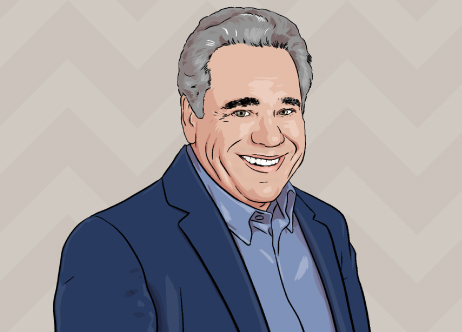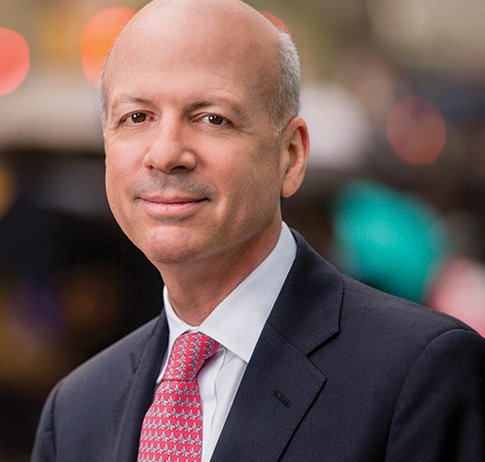Article
The Global Rethinkers: Financial Times interview with Rinaldo Brutoco
3 April 2023 | 5 minute read
Clean, green fuel for all sounds too good to be true, but this entrepreneur’s new airship could make the hydrogen economy a reality

“People said Steve Jobs was crazy. Why would anybody want a personal computer? Why would I want a fax machine? Why would I want an automobile, when horses do such a good job? All of these disruptive changes occurred because the economics are overwhelming,” says entrepreneur Rinaldo S Brutoco from his home in Santa Barbara, California. “That's what's going to happen here. It's no longer a question of whether hydrogen is going to happen. We are going to be in a hydrogen economy. Mark my words, hydrogen will be bigger than the Industrial Revolution.”
Hydrogen fuel, as Brutoco would be the first to tell you, is a more sustainable alternative to fossil fuels that creates fresh water as its only byproduct. “We have got to cure our fossil fuel addiction,” he says. “And the only possible way that I can see is by integrating hydrogen as a primary fuel carrier.” The reason it’s not currently everywhere is partly because hydrogen fuel is logistically difficult and expensive to transport and distribute, not least because it needs to be kept at temperatures hundreds of degrees below freezing.
Supply chain innovation
Brutoco speaks with evangelical zeal about H2 Clipper, the California-based company he now heads to improve hydrogen supply chains. Its innovations include an airship that can transport hydrogen more easily than ever before, and a safety pipe for routing it into and out of ports and urban areas.
Hydrogen fuel is a more sustainable alternative to fossil fuels that creates fresh water as its only byproduct
The wingless airship, or ‘clipper’, is itself hydrogen-powered, taking off vertically, and can travel at an unprecedentedly fast 150mph. “What’s exciting is the clipper can take liquid hydrogen, which no one thought you could ever ship in the air before without turning the airship into a popsicle,” says Brutoco (as it has to be stored below -250°C). The clipper, due to fly in 2029 or 2030, can also transport conventional freight. “That ability to carry freight in the reverse direction at a fraction of the cost of a super freighter, gives me the ability to reduce the cost of the delivery of hydrogen,” he says.
The potential impact of these developments is clear to Brutoco: “If I can show somebody how to make as much money – or more – in the hydrogen economy as they're making in the old economy, we solve the climate change issue.”
Now in his mid-seventies, Brutoco is an affable, chatty Italian-American who speaks with the confidence of someone who has achieved success by building companies worth billions of dollars. His past ventures include building the American clothing brand Men’s Wearhouse into a $3bn operation and, early on, launching the first ever pay cable TV company in 1972. Brutoco’s portfolio over the last 40 years is united by what we might today call corporate social responsibility, including funding think tanks devoted to how business acumen can be used to solve all manner of societal challenges.
Brutoco’s interest in renewable energy sources is also longstanding. Rather than any lightbulb moment, it was at the end of exhaustive research for a 2007 book that he concluded hydrogen was the future. “When I looked at every single way to reduce our fossil fuel addiction, I realised it was going to end up being hydrogen. And I think that the world has come around to that,” he says. “I can say that with some confidence because I do a lot of work advising the office of the German finance minister, and the private office of President Macron. We’re also doing work in Spain, and some in the US.”
Ambitions beyond ideation
Given his status as a business leader, not to mention the existential threat of climate change, it makes sense that Brutoco has the ear of (at least some) governments. “This is not my first rodeo,” as he puts it. “I've got a track record for having built some big companies, and this one's going to be very big. I will be shocked if our company is not a unicorn within two years because the patent portfolio alone is going up in that direction.” An independent evaluation from KPMG backs him up on this point.
Brutoco is not perhaps a typical environmentalist, or even a straightforward one, but he is almost certainly the kind that the world needs more of
The concept of H2 Clipper is not to compete with fuel manufacturers but rather to give them the infrastructure to move more quickly away from fossil fuels and towards hydrogen. “Our business is moving hydrogen,” says Brutoco. “Picking a field that no one else was in keeps us from having any enemies, so all we got is allies!” There is only one meaningful enemy as far as he is concerned. “To me, it’s real simple. The enemy is climate change.”
Brutoco is not perhaps a typical environmentalist, or even a straightforward one, but he is almost certainly the kind that the world needs more of. “It’s great to be a visionary. But if you’ve got both feet planted in midair, you’re not going to help anybody. You’ve got to be practical,” he says of his approach to slowing climate change.
“Every one of my business models is designed to monetise the right conduct, and then I hope people copy me,” he says. “Because if they copy me, it happens faster. It works in my favour to accelerate the whole curve. That’s what an environmentalist does, but that’s also what a good business person does! I’m just combining the two.”
The Global Rethinkers
We're getting behind some of the founders and innovators who are changing our world. Check out our hub to find out more.



